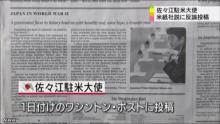中国や韓国にいわれても納得はできませんが、気持ちはまあわかります。
ただ、アメリカから言われると非常に気分が悪いのは私だけでしょうか?
まず、日本の総理の歴史認識をとやかく言う前に、日本に原爆を落としたことに正式な謝罪はあったのか?
遡ってハワイやアメリカ大陸への進出は、「侵略」ではないのか?
もともといた人々に領土を返すくらいのことはしてもいいのではないか?
これらもすべて歴史認識ではないのか?
ワシントン・ポストを読んでいるわけではないのでわかりませんが、
彼らには「歴史と向き合う能力」があるのでしょうか?私には疑問です。
一国の総理の批判をするのであれば、こちらもいうことは言わせてもらわねばなりません。
日本人がコケにされているようなものです。
みなさん、歴史を学んで言うべきことははっきりと、そして堂々といいましょう!!
そのために近現代史のチャンネルを作りました!!
CGS
一緒に学んで、歴史と向き合いましょう!!
反論するにも知識が必要です。
安倍政権は「歴史と謙虚に向き合っている」 駐米大使が米紙社説に反論
2013.5.2 09:58 産経
【ワシントン=犬塚陽介】米紙ワシントン・ポストは1日、安倍晋三首相には「歴史と向き合う能力がない」と批判した社説に反論する佐々江賢一郎・駐米大使の反論文を掲載した。大使は、これまでにも日本政府は「深い自責と心からの謝罪」をしていると説明し、安倍政権も同様の見解であることを強調した。
佐々江大使は、安倍政権が「歴史と正面から謙虚に向き合うことが常に重要と信じている」と指摘した上で、歴史の直視は歴史家や知識人が調査し、掘り下げた「個別の事実とともに促進されるのが望ましい」との見方を示した。
また、日本は自由や民主主義を戦後の国家の基本としており、「アジア太平洋地域の平和と繁栄に貢献を続ける」との立場を改めて強調した。
ワシントン・ポストは4月27日付の社説で、安倍首相による「侵略の定義は学会的にも国際的にも定まっていない。国と国との関係で、どちらから見るかで違う」との発言を「自己破壊的な(歴史の)修正主義」などと批判していた。
首相の歴史認識への批判に駐米大使反論
5月2日 5時59分 NHK

アメリカの新聞「ワシントン・ポスト」が安倍総理大臣の歴史認識を巡る発言を批判する社説を掲載したことに対し、佐々江駐米大使が、日本は歴史に常に正面から向き合ってきたという内容の反論を投稿しました。
ワシントン・ポストは、先月27日付けの紙面に、「歴史を直視できない安倍総理大臣」というタイトルの社説を掲載し、安倍総理の歴史認識を巡る最近の発言について、「歴史を直視しなければ近隣諸国が納得できる決着は難しくなる」などと批判しました。
これに対し、佐々江駐米大使が1日付けのワシントン・ポストに投稿し、この中で、「日本政府は痛切な反省と心からのおわびの気持ちを表明するとともに、第2次世界大戦の内外のすべての犠牲者に謹んで哀悼の意を表明してきた」と反論しました。
そのうえで、「日本政府は、歴史に常に謙虚に正面から向き合うことが重要だと信じている」としたうえで、「過去から教訓を学んだからこそ、戦後の日本は、自由、民主主義などの価値観に基づく社会を築き、アジアの平和と繁栄に一貫して貢献してきた」として理解を求めています。
今回、佐々江大使が反論を投稿した理由について、ワシントンの日本大使館は、「日本政府の立場をアメリカの人々にしっかりと伝える必要があると考えた」と説明しています。
Shinzo Abe’s inability to face history
- Washington Post
(歴史を直視できない安倍総理大臣)
By Editorial Board, Published: April 27
FROM THE MOMENT last fall when Shinzo Abe reclaimed the office of Japanese prime minister that he had bungled away five years earlier, one question has stood out: Would he restrain his nationalist impulses — and especially his historical revisionism — to make progress for Japan?
Until this week, the answer to that question was looking positive. Mr. Abe has taken brave steps toward reforming Japan’s moribund economy. He defied powerful interest groups within his party, such as rice farmers, to join free-trade talks with the United States and other Pacific nations that have the potential to spur growth in Japan. He spoke in measured terms of his justifiable desire to increase defense spending.
This week he seemed willing to put all the progress at risk. Asked in parliament whether he would reconsider an official apology that Japan issued in 1995 for its colonization of Korea in the past century, Mr. Abe replied: “The definition of what constitutes aggression has yet to be established in academia or in the international community. Things that happened between nations will look differently depending on which side you view them from.”
Officials in South Korea and China responded with fury, and understandably so. Yes, history is always being reinterpreted. But there are such things as facts. Japan occupied Korea. It occupied Manchuria and then the rest of China. It invaded Malaya. It committed aggression. Why, decades after Germany solidified its place in Europe by facing history honestly, are facts so difficult for some in Japan to acknowledge?
We understand that South Korea and, to an even greater extent, China at times stoke anti-Japan sentiment for domestic political purposes. China distorts its own history and, unlike Japan, in many cases does not allow conflicting interpretations to be debated or studied. But none of that excuses the kind of self-destructive revisionism into which Mr. Abe lapsed this week.
An inability to face history will prejudice the more reasonable goals to which South Korea and China also object. Mr. Abe has valid reasons, given the defense spending and assertive behavior of China and North Korea, to favor modernization of Japan’s defense forces. He has good reason to question whether Japan’s “self-defense” constitution, imposed by U.S. occupiers after World War II, allows the nation to come to the aid of its allies in sufficient strength. But his ability to promote reform at home, where many voters remain skeptical, and to reassure suspicious neighbors plummets when he appears to entertain nostalgia for prewar empire.









